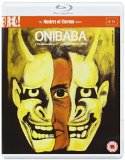 ONIBABA (Masters of Cinema) (Blu-ray) | Blu Ray | (25/02/2013)
from £13.35
| Saving you £6.64 (49.74%)
| RRP
ONIBABA (Masters of Cinema) (Blu-ray) | Blu Ray | (25/02/2013)
from £13.35
| Saving you £6.64 (49.74%)
| RRP Kaneto Shindo, one of Japan's most prolific directors, received his biggest international success with the release of Onibaba (The Demoness) in 1964. Its depiction of violence and graphic sexuality was unprecedented at the time of release. Shindo managed - through his own production company Kindai Eiga Kyokai - to bypass the strict, self-regulated Japanese film industry and pave the way for such films as Yasuzo Masumura's Mojuu (1969) and Nagisa Oshima's In the Realm of the Senses (1976). Onibaba (or Onibabaa, in its alternate spelling) is set during a brutal period in history, a Japan ravaged by civil war between rivaling shogunates. Weary from combat, samurai are drawn towards the seven-foot high susuki grass fields to hide and rest themselves, whereupon they are ambushed and murdered by a ruthless mother (Nobuko Otowa) and daughter-in-law (Jitsuko Yoshimura) team. The women throw the samurai bodies into a pit, and barter their armour and weapons for food. When Hachi (Kei Sato), a neighbour returning from the wars, brings bad news, he threatens the women's partnership. Erotically charged and steeped in the symbolism and superstition of its Buddhist and Shinto roots, Kaneto Shindo's Onibaba is in part a modern parable on consumerism, a study of the destructiveness of sexual desire and - filmed within a claustrophobic sea of grass - one of the most striking and unique films of Japan's last half-century, winning Kiyomi Kuroda the Blue Ribbon Award for Cinematography in 1965. The memorably frenetic drumming soundtrack was scored by long-time Shindo collaborator Hikaru Hayashi. The Masters of Cinema Series is proud to present Onibaba for the first time on Blu-ray in the UK. Special Features: Gorgeous New 1080p HD Transfer Full-length Director's Audio Commentary by Director Kaneto Shindo and the Stars of the Film, Kei Sato, and Jitsuko Yoshimura Video Introduction by Alex Cox 8mm Footage (40-minutes) Shot on Location by Lead Actor Kei Sato Optional English Subtitles Original Theatrical Trailer Production Stills and Promotional Art Gallery 36-Page Booklet with a New Essay by Doug Cummings - An English translation of the original short Buddhist fable that inspired the film and a statement from Writer/Director Kaneto Shindo about why he made Onibaba
![Kuroneko (1968) [Masters of Cinema] Dual Format (Blu-ray & DVD)](/pictures/1136688.jpg) Kuroneko (1968) | Blu Ray | (20/07/2015)
from £12.59
| Saving you £3.40 (27.01%)
| RRP
Kuroneko (1968) | Blu Ray | (20/07/2015)
from £12.59
| Saving you £3.40 (27.01%)
| RRP Kaneto Shindô's Kuroneko (Yabu no naka no kuroneko or The Black Cat Inside the Bamboo Grove) — released to great acclaim in 1968 — is a sparse atmospheric horror story ascribing to the director’s philosophy of using beauty and purity to evoke emotion. Eccentric and more overtly supernatural than its breakthrough companion piece Onibaba Kuroneko revisits similar themes to reveal a haunting meditation on duty conformity and love. In this magnificently eerie and romantic film — loosely based on the Japanese folktale The Cat’s Return — a mother and daughter-in-law (Nobuko Otowa and Kiwako Taichi) are raped and murdered by pillagers but return from the dead as vampiric cat spirits intent on revenge. As the ghosts lure soldiers into the bamboo groves a fearless samurai Gintoki (Kichiemon Nakamura) is sent to stop their reign of terror. Kuroneko remains a standout film of the kaidan eiga genre of period ghost stories often based on old legends or kabuki plays. Marking Shindô’s first use of wire work as Yone and Shige battle against samurai blades the film is subtly complimented by Kiyomi Kuroda’s award-winning chiaroscuro cinematography Hikaru Hayashi’s vibrant score and riveting performances from many of the greatest actors of Japan’s golden age of film.
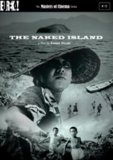 The Naked Island (Masters of Cinema) (1960) | DVD | (20/06/2005)
from £N/A
| Saving you £N/A (N/A%)
| RRP
The Naked Island (Masters of Cinema) (1960) | DVD | (20/06/2005)
from £N/A
| Saving you £N/A (N/A%)
| RRP Kaneto Shindo's Naked Island tells the story of a small family unit and their subsistence as the only inhabitants of an arid sun-baked island. Daily chores captured as a series of cyclical events result in a hypnotising moving and beautiful film harkening back to the silent era. With hardly any dialogue Shindo combines the stark 'Scope' cinematography of Kiyoshi Kuroda with the memorable score of his constant collaborator Hikaru Hayashi to make a unique cinematic document. Fil
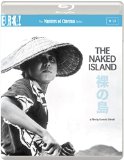 NAKED ISLAND, The (Masters of Cinema) (BLU-RAY) | Blu Ray | (24/06/2013)
from £N/A
| Saving you £N/A (N/A%)
| RRP
NAKED ISLAND, The (Masters of Cinema) (BLU-RAY) | Blu Ray | (24/06/2013)
from £N/A
| Saving you £N/A (N/A%)
| RRP Filmed on the virtually deserted Setonaikai archipelago in south-west Japan The Naked Island [Hadaka no shima] was made - in the words of its director - as a 'cinematic poem' to try and capture the life of human beings struggling like ants against the forces of nature. Kaneto Shindô (Onibaba Kuroneko) made the film with his own production company Kindaï Eiga Kyôkai who were facing financial ruin at the time. Using one-tenth of the average budget Shindô took one last impassioned risk to make this film. With his small crew they relocated to an inn on the island of Mihari where for two months in early 1960 they would make what they considered to be their last film. The Naked Island tells the story of a small family unit and their subsistence as the only inhabitants of an arid sun-baked island. Daily chores captured as a series of cyclical events result in a hypnotising moving and beautiful film harkening back to the silent era. With hardly any dialogue Shindô combines the stark 'Scope cinematography of Kiyoshi Kuroda with the memorable score of his constant collaborator Hikaru Hayashi to make a unique cinematic document. Shindô who had worked with both Kenji Mizoguchi and Kon Ichikawa shot to international fame in 1952 with the astounding Children of Hiroshima. Eight years later the BAFTA-nominated The Naked Island won the Grand Prix at the Moscow International Film Festival (where Luchino Visconti was a jury member). It is now considered to be one of Shindô’s major works and its success saved his film company from bankruptcy. The Masters of Cinema Series is proud to release The Naked Island for the first time on Blu-ray in the UK. Special Features: Newly restored 1080p transfer in its 2.35:1 original aspect ratio Full-length audio commentary by director Kaneto Shindô and composer Hikaru Hayashi Video introduction by Alex Cox Optional English subtitles 24-page booklet with an essay by Acquarello and a reprint of Joan Mellen’s interview with Shindô from Voices from the Japanese Cinema
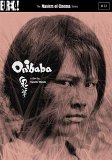 Onibaba | DVD | (22/08/2005)
from £N/A
| Saving you £N/A (N/A%)
| RRP
Onibaba | DVD | (22/08/2005)
from £N/A
| Saving you £N/A (N/A%)
| RRP Deep within the wind-swept marshes of war-torn medieval Japan an impoverished mother and her daughter-in-law eke out a lonely desperate existence. Forced to murder lost Samurai and sell their belongings for grain they dump the corpses down a deep dark hole and live off the meagre spoils. When a bedraggled neighbour the former friend of the woman's son returns from the skirmishes lust jealousy and rage threaten to destroy the trio's tenuous existence before an ominous ill-g
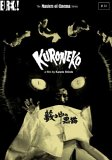 Kuroneko | DVD | (20/08/2005)
from £26.98
| Saving you £-6.99 (N/A%)
| RRP
Kuroneko | DVD | (20/08/2005)
from £26.98
| Saving you £-6.99 (N/A%)
| RRP A companion piece to his 1964 classic 'Onibaba' this is another stylish ghostly folk tale from Kaneto Shindo shot in dreamy black and white Tohoscope with another eerily menacing score from Hikaru Hayashi. Delving beyond the superficial Shindo once again examines class conflict as the arrogant Samurai elite rape and murder a woman and her daughter-in-law only to find that as shape-shifting demons the wronged peasant women will exact a terrifying revenge...
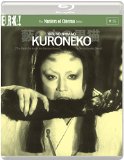 KURONEKO (Masters of Cinema) (BLU-RAY) | Blu Ray | (24/06/2013)
from £N/A
| Saving you £N/A (N/A%)
| RRP
KURONEKO (Masters of Cinema) (BLU-RAY) | Blu Ray | (24/06/2013)
from £N/A
| Saving you £N/A (N/A%)
| RRP Shindo's stylish black-and-white ghost story forms a companion piece to his earlier film Onibaba. Once again we have a woman and her daughter-in-law preying on a lone samurai. But the mood here is a little gentler and more poignant than we are accustomed to. The two women are victims of a brutal gang of samurai: they are raped and killed and fire is set to their hut. But when their cat licks the blood from their corpses, they are transformed into shape-shifting demons that favour the form of black cats. Waylaying benighted warriors, they wreak their revenge. A champion samurai is sent against them, but he finds the monsters he's hired to destroy are his own wife and mother. Shindo skilfully builds an atmosphere of eerie menace--draperies waving in the wind, Hikaru Hiyashi's score mimicking the desolate caterwauls that precede each killing. Shindo, faithful as ever to his left-wing principles, includes a strong measure of barbed social comment in his portrayal of the arrogant samurai class. --Philip Kemp

Please wait. Loading...
This site uses cookies.
More details in our privacy policy